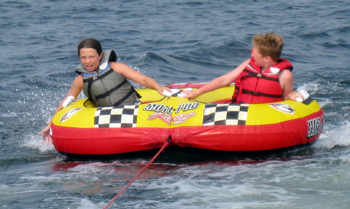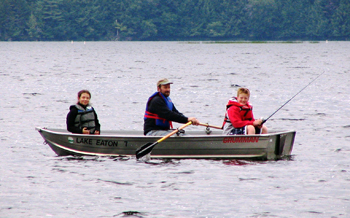Water Related Activities

Water Skiing & Other Towed Activities
Water skiing, tubing and parasailing are quickly growing in popularity on New York's waterways. Classified in the Navigation Law as 'Towing of Persons', these sporting activities have a few simple rules that must be followed to remain legal, and more importantly, safe!
- Three people are required as a minimum for these activities:
- Operator - responsible for handling the vessel, avoiding other boats, and providing a smooth, steady ride for the skier or tuber.
- Observer - must be at least 10-years-old, and is responsible for watching the skier and relaying the status of the skier to the operator. The observer should know the hand signals a skier might use.
- Skier - responsible for his or her own well being, skiers should know the proper hand signals used to convey their status to the observer
- No towing activities are permitted between sunset and sunrise.
- All people being towed behind a vessel (excluding those being towed on another vessel) are required to wear a securely fastened USCG approved life jacket. Type III jackets are considered the best for these activities. To learn more, please see the section on Personal Flotation Devices.
- A boat engaged in towing receives no special consideration under the Rules of the Road. They must give way to other vessels, or stand on as the circumstances require. Check out the Rules of the Road to review these circumstances.
- Stay well clear of shore, docks, swimmers and other vessels. Intentionally engaging in dangerous maneuvers may be considered to be 'Careless/Reckless' and constitutes a misdemeanor.
- The skier is considered to be a passenger on the vessel, an important consideration when determining your carrying capacity. If you plan on towing a tube or skier with your personal watercraft, it must be rated for at least three persons; the operator, an observer, and the skier.

Scuba and Skin Diving
Boaters should always be on the look-out for the 'diver down' flag, red with a white diagonal stripe, as shown to the right. These flags indicate that there is a diver in the vicinity, and that boats should keep at least 100 feet away. Be aware that while the diver should be within 100 feet of the flag, they may be slightly further away. Pass these flags as wide as possible, and be on the lookout for air bubbles indicating the divers position.
You may also see the blue and white 'alpha flag', which also indicates a diver is in the vicinity. These flags are intended for use on vessels that are restricted in their ability to maneuver due to dive operations they are conducting.
Boater's Responsibility
- Keep back 100' of either flag unless you are actively servicing surfaced divers.
- Give right of way to vessels displaying the alpha flag.
- Outside of 100' approach with caution and communication.
Diver's Responsibility
- Stay within the 100 foot buffer zone of the divers flag.
- Display both flags when engaged in diving operations that restrict maneuverability.
Fishing and Hunting

For many people, the only reason they own a boat is to get to out-of-the-way fishing spots. There are any number of boats designed and built specifically for the sportsman, from bass boats to boats specially equipped for trolling. If you see someone fishing from their boat, try and stay clear of them. They may have lines or nets in the water that you might damage if you came too close. Your wake may also swamp or flip their boat, pull their anchor loose from the bottom, or dump one of the occupants in the water. Remember: state law makes you responsible for any damage caused by your wake when passing other boats, docks or swimmers.
If you are fishing or hunting from your boat, try and stay out of the main boating channels. Be constantly aware of wakes from other vessels as you move about your boat. Most importantly, remember that cold water kills. Wear your life jacket!
Swimming
If you plan on swimming from your boat in the middle of a lake or other waterway, remember these important safety considerations first.
- Anchor or moor your boat securely. If it drifts away you may not be able to swim back to it.
- Unless you are an extremely strong swimmer, wear a life jacket. If the water is cold or the current is strong, definitely wear your life jacket!
- Stay near your vessel. Other boats may not see you in the water, but they will see, and steer clear of, your boat.
- Always swim with a buddy
- Boats emit carbon monoxide
 , a colorless, odorless gas. Turn your motor off while swimming, as these fumes will gather
on the water and you may be overcome by the fumes while swimming.
, a colorless, odorless gas. Turn your motor off while swimming, as these fumes will gather
on the water and you may be overcome by the fumes while swimming.


